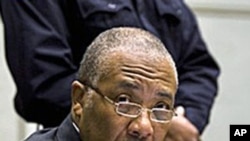The war crimes trial of former Liberian president Charles Taylor has ended after more than three years. A verdict from the U.N.-backed special court is expected later this year.
Mr. Taylor is pleading not guilty to 11 counts of war crimes and crimes against humanity for his alleged support of rebels in neighboring Sierra Leone who murdered, raped, and mutilated civilians during the country's civil war.
Chief prosecutor Brenda Hollis asked judges to find Mr. Taylor guilty on all counts.
"Credible evidence in this case proves this accused guilty beyond a reasonable doubt of each and every count of this indictment," she said.
Mr. Taylor's lead defense attorney Courtenay Griffiths says the prosecution is making assumptions in the absence of proof.
"It is somewhat surprising that there is very little direct evidence to link the accused to the crimes alleged," he said. "For the most part, this prosecution's attempt to link the accused to the alleged crimes has largely focused on hearsay, circumstantial evidence, and broad assumptions."
Griffiths says prosecutors have "besmirched the lofty ideals of international criminal law by turning this case into a 21st century form of neocolonialism." Hollis says Griffiths overlooks the fact that it was the government of Sierra Leone that asked the United Nations to establish this special court.
"And there is also a perverse sort of logic in this argument. And the logic seems to be that unless the heads of African states will create courts or can create courts to punish crimes within their country, even crimes that offend everyone of us as members of the global community, unless they do that, the rest of the world should simply butt out," she said. "Because if they don't do it, then these victims should be left without justice. Somehow they deserve lesser justice. We suggest to you that is not the case."
Griffiths criticized Hollis for calling to the stand the British model Naomi Campbell who allegedly received diamonds from Mr. Taylor following a dinner in South Africa. Campbell testified that she did not know who sent her what she called several "dirty looking stones" until breakfast the next morning. Griffiths told the court he is at a loss as to how a gift of diamonds in South Africa links Charles Taylor to the purchase of arms.
"The calling of Naomi Campbell was a complete disaster for the prosecution," he said. "My learned friend, Miss Hollis, was left looking at a bleeding hole in her foot and a smoking gun in her hand, asking 'I didn't know it was loaded.' Because they ended up first of all seeking to impeach their own witness. Then when that didn't work trying to abandon her. 'Oh, she is not a prosecution witness after all.' Well who obtained the subpoena to call her?"
Griffiths says Mr. Taylor is the victim of "selective prosecution" because Libyan leader Moammar Gadhafi and Burkinabe President Blaise Compaore were equally responsible for backing rebels in Sierra Leone. Hollis says no one's role in this conflict compares with Mr. Taylor's
"He was at the very center of the web of the crimes in Sierra Leone. Gadhafi? Compaore? They helped build that web and they helped maintain that web through Charles Taylor," she said. "The international community did not go to Gadhafi, did not go to Blaise Compaore. They went to Charles Taylor because he was the one who had control over leaders of these groups that were perpetuating such horrific crimes."
The U.N.-backed Special Court for Sierra Leone can not impose the death penalty. So if convicted, Mr. Taylor faces a maximum sentence of life in prison.
Charles Taylor War Crimes Trial Ends









